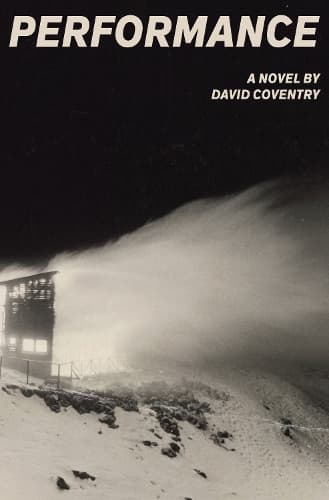Review: Performance, by David Coventry
Reviewed by Michalia Arathimos
David Coventry’s third book, Performance, is described variously in his publisher’s material as life transcription, a series of disorienting journeys, a self-portrait, and, in the words of writer Tracey Slaughter, ‘a monumental achievement.’ It is also described as a novel. Performance references Coventry’s experience of ME/CFS, a debilitating disease whose symptoms have no known medical cure.
Novel, autofiction, creative non-fiction or memoir, this work eludes the boundaries of conventional expectation and form. It's also a cracking story, displaying the fine novelistic impulse that has won Coventry literary awards. The result, a text with footnotes and an unreliable narrator, does in fact live up to Slaughter’s praise. It is that rare thing: a monumental achievement.
It is also less a novel and more an act of creative transcendence. Transcendence of illness, of an impaired state, of the limitations of the body, and of the rules of linear storytelling. Writing of the work of an artist friend, Coventry wonders if ‘in the process of painting, the work itself will solve the illness, that escape is at the end of the correct brushstroke’. Performance is a series of correct brushstrokes.
Coventry often refers to memory, highlighting the need for a novel to remember itself. This work both remembers itself and makes the main character David remember himself remembering. Stories are threaded within stories like nested dolls. But the book also enacts a kind of forward-remembering, taking us from the present into a jarring future, where we learn, for example, that a character we like will die.
Throughout the book Coventry mentions his twin, a double of himself who exists when the David character is suffering an ME attack. Sufferers of chronic pain will tell you that the imagination can act as a corrective to the unbearable real. Coventry indicates that he won’t just write about suffering, about those periods in which he loses the ability to move or speak. He turns to the outer world, recounting the story of his father and brother and friend climbing a mountain, or a trip to Britain or Isola della Scogliera Rossa, or Karangahape Road. In this we can read a stalwart resistance, and a refusal to reveal the shadow narrative. David the character moves through the world and through his own personal history freely; Coventry the writer allows us a glimpse of the character’s double, the writer himself, struggling, sometimes incapacitated.
Death is a constant companion here, and also a wry humour. Coventry tells us: ‘My condition won’t kill me, at least it’s unlikely.’ In a footnote, he informs us: ‘Suicide remains the most common cause of ME deaths.’ In light of the epigraph at the beginning of the book, a quote from Thomas Bernhard describing work as an antidote to taking one’s own life, it’s clear that the preoccupation with escape is not a theoretical stance. The book is a deliberate act of will. Words placed on the page that create a world outside of limitations.
Coventry writes about the slippage between well and unwell, and how quickly that transition can happen. The book lies in the interstices between self and shadow self and past and present, between surreal and real. The monumental achievement here is that Coventry effectively carves out a third space. This space is place of refuge.
But the tone is irreverent. This is what makes the shadow narrative all the more affecting, the one in which character David, and beneath that, Coventry, are refusing to submit. His prose is straightforward, but he sneaks in the best words: oneiric, predicable, quixotic, stelae, escalent. Then he shocks us: ‘My body is a bastard, a liar, a scoundrel...’ His body, he writes, is ‘a traitorous fuck.’
Performance is complex, sophisticated, and punk as fuck. The gift Coventry gives us as readers is to trust us with the time slips and the unreliability and fluidity. To trust us to read into this space.
Reviewed by Michalia Arathimos
